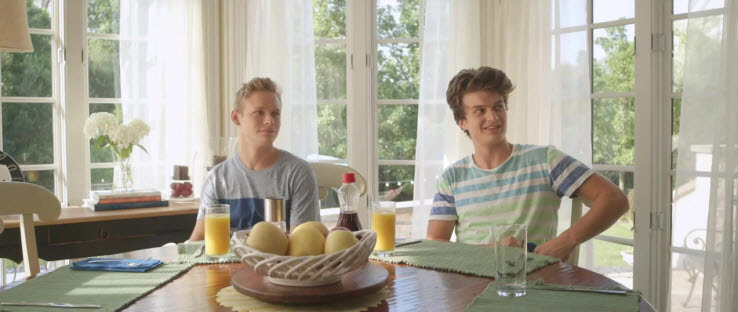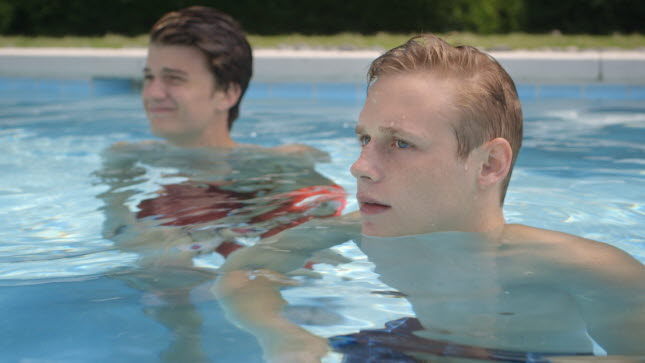“Henry Gamble’s Birthday Party” is a modest but engaging drama mainly revolving around the family birthday party for its sexually repressed adolescent hero. While simply hanging around him and a bunch of Christian characters around him during one long day, the movie generates a series of genuine emotional moments to observe, and we come to understand these mundane characters more than expected as accepting their human issues and shortcomings with some amusement.
During the opening scene, the movie shows us the titular hero talking with one of his male friends in his bedroom before they sleep. On the surface, the boys are simply talking about girls and sex, and it gradually becomes apparent to us that Henry (Cole Doman) is a gay, and it was rather amusing for me to see him excited much more about masturbating along with his friend than what they are supposed to imagine together in their minds. To be frank with you, the first sexual experience of my old adolescent years was not so different from that – except that I and that boy ended up, uh, stimulating each other’s phallus a lot during that memorable night of January 1997.
The next day is the 17th birthday of Henry, who, according to him and his family, was born exactly at 10:02 AM on that day. As his parents, Bob (Pat Healy) and Kat (Elizabeth Laidlaw), prepare the breakfast, Henry and his friend cheerfully talk with his parents and his older sister Autumn (Nina Ganet), and it looks like they will all have a pretty fun time along with a number of guests to come to the upcoming birthday party for Henry.
Henry’s birthday party is soon held around the swimming pool inside his family residence, and some of Henry’s friends and his parents’ close neighbors come to the party. As Henry and other young people are casually spending time together in the pool, we get to know a bit about them, and then we come to sense that one of the boys is actually interested in getting closer to Henry, though he is not so willing to respond to this boy’s indirect signal.
However, to our little surprise and amusement, many of the Christian characters turn out to be more flexible than expected. Yes, one of the adult characters in the story seems to have watched those nutty right-wing conservative new channels too much, but it is clear that the other adult characters in the story do not pay much attention to whatever this character says while merely pretending to listen to this character. In case of Henry and other younger characters in the story, homosexuality is not a taboo at all, and we later see them have some frank conversation about faith and tolerance, though they are still limited by their rather narrow worldview.
And we come to observe how secular the adult Christian characters in the story are in more than one way. It is no secret among them that Bob and Kat have been estranged from each other, but they are still trying their best for maintaining their status quo while also supported by their fellow churchgoers. In addition, they are not hypocrites at all when they come to feel more need to have some fun as the day is being over. When Bob shows a certain hidden stuff to one of the party guests at one point, they make a fairy good justification for enjoying that a bit (If Jesus had no problem with that, why not?), and, of course, the mood of the party eventually becomes much looser as they come to share that along with almost every adult at the spot.
The screenplay by director/writer/co-producer Stephen Cone, who also unofficially served as the editor of the film, subsequently takes a dark turn via a certain supporting character who looks quite troubled to say the least right from the beginning, but the movie continues to glide around its characters as before, and cinematographer Jason Chiu deftly captures a considerable degree of spontaneity and verisimilitude on his camera. I have no idea on how much the final result is actually close to Cone’s screenplay, but Cone and his crew members, who shot the film during only 18 days, did a good job of immersing us into the characters’ ongoing situation, and we often feel like one of the guests as coming to pay more attention to the story and characters.
The cast members are all convincing in their unadorned appearance. While Cole Doman’s earnest acting humbly holds the center as required, Pat Healy, who has been one of the most dependable American independent movie performers since his chillingly nasty supporting turn in Craig Zobel’s “Compliance” (2012), quietly conveys to us his character’s understandable emotional issues, and Elizabeth Laidlaw and Nina Ganet have a calm but poignant scene where Autumn and Kat happen to have a sincere and honest conversation about Autumn’s recent personal problem. As frankly admitting when she let herself feel better in a certain way some time ago, Kat gives a sensible practical advice to her daughter, and Autumn certainly appreciates that a lot besides feeling much better than before.
In conclusion, “Henry Gamble’s Birthday Party” alternatively amused and touched me with human depth and insight observed from its Christian characters. In my trivial opinion, they are surely better people than those loud and superficial Christian zealots with zero tolerance for others out there, and I sincerely hope that people are indeed changing along with the world as suggested by this small but wonderful film.










